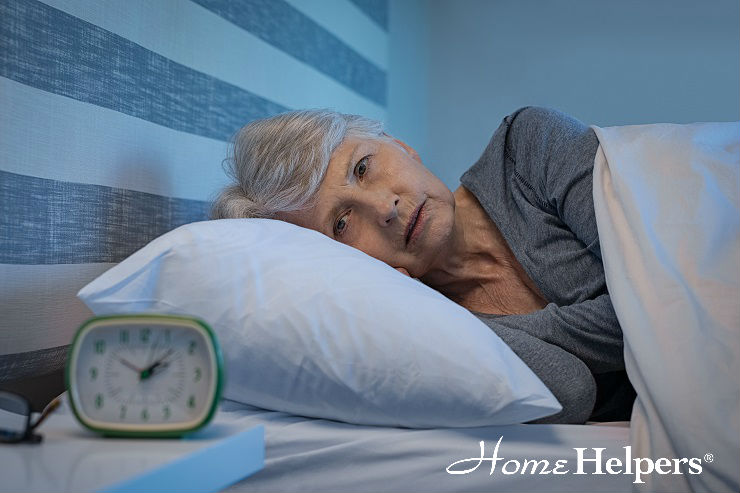All adults need 7-9 hours of sleep, no matter our age. However, as we age, it’s common to go to bed earlier and rise earlier than you once did. Even if you were a night owl as a younger person, you may tend to shift to more of a morning person.
Older adults often find themselves feeling frustrated when they can’t get to sleep or sleep through the night. It can happen for a variety of reasons, not the least of which could be medications, pain, or even depression.
Not getting proper rest can cause many issues, including:
- Feeling irritable.
- Feeling forgetful during the day.
- Feeling symptoms of depression.
- Being more prone to accidents or falls.
Getting a Good Night's Sleep
It’s a myth that just because you age, you will be constantly tired or fatigued. Here are some ideas to help you get the rest you need so you can live life fully!
- Go to sleep at the same time each night. It might be challenging, but your body will thank you if you can go to bed and get up at the same time, including travel days and weekends.
- Try not to take naps too late in the day. Taking long naps in the afternoon will definitely keep you awake at night.
- Create a routine for bedtime. Reading, taking a soothing bath, listening to calming music are all ways to prepare your mind and body for nighttime rest.
- Avoid having a TV or computer in the bedroom. Your body needs quiet and darkness to sleep deeply. The light and noise from these devices can interrupt your sleep patterns.
- Keep the thermostat at a cooler temperature that is comfortable at night.
- Use soft lamps and cozy lighting at night as you prepare for sleep.
- Make sure your exercise routine doesn’t take place within 3-4 hours of bedtime.
- Don’t eat heavy meals at night.
- Avoid caffeine.
- Resist the temptation for alcohol—it doesn’t help you sleep any better.
Older Adults Commonly Have Insomnia
For older adults over age 60, insomnia is the most common problem they experience. This means that they may struggle with falling or staying asleep at night. It can often become chronic and can include the following issues:
- Lying in bed a long time before falling asleep.
- Waking up frequently.
- Waking up too early and being unable to drift back to sleep.
- Waking up feeling tired.
- Struggling to stay awake during the day.
Sometimes, insomnia just becomes habitual after we struggle with it for any length of time. It can cause anxiety before bedtime, which compounds the problem.
Older adults may want to try over-the-counter sleep aids before talking to their doctor about possible prescription medicines that help insomnia. These medications are good for short-term use, but not generally recommended for extended use.
The biggest way to help reverse insomnia is to develop good, consistent routines at night so your body will know what to expect at the same time each night.
Remember, your bedroom is the only place that should be used for sleeping. If you have laid down in the dark for more than a half-hour without falling asleep, go ahead and get out of bed. Read a book or do a quiet activity until you begin to feel sleepy and try again to go to bed.
If you find that you are struggling with insomnia for weeks on end, it’s time to talk to your doctor. He may recommend a sleep study to find the cause of the problem, such as snoring or being unable to enter REM sleep. Most sleep issues can be addressed successfully.
Use your bedroom only for sleeping. After turning off the light, give yourself about 20 minutes to fall asleep. If you’re still awake and not drowsy, get out of bed. When you feel sleepy, go back to bed.
If you feel tired and unable to do your activities for more than 2 or 3 weeks, you may have a sleep problem. Talk with your doctor about changes you can make to get a better night’s sleep.
For more information on helping seniors fall and stay asleep, please contact us today!
Home Helpers of Kenosha is a locally-owned, trusted home health care agency and offers quality, compassionate senior in-home care services including home care assistance, personal care, companion care, respite care, 24-hour care and live-in care, Alzheimer's & dementia care, Parkinson's care as well as homemaker services in Kenosha, Racine, Sturtevant, Somers, Union Grove, and Bristol, Wisconsin.
Legal Disclaimer
This blog provides general information and discussions about medicine, health, and related subjects. The words and other content provided in this blog, and in any linked materials, are not intended and should not be construed as medical advice. If the reader or any other person has a medical concern, he or she should consult with an appropriately-licensed physician or other healthcare workers.
Never disregard professional medical advice or delay in seeking it because of something you have read on this blog or in any linked materials. If you think you may have a medical emergency, call your doctor or 911 immediately.
The views expressed on this blog and website have no relation to those of any academic, hospital, practice or other institution with which may have been mentioned or linked to in the article.

